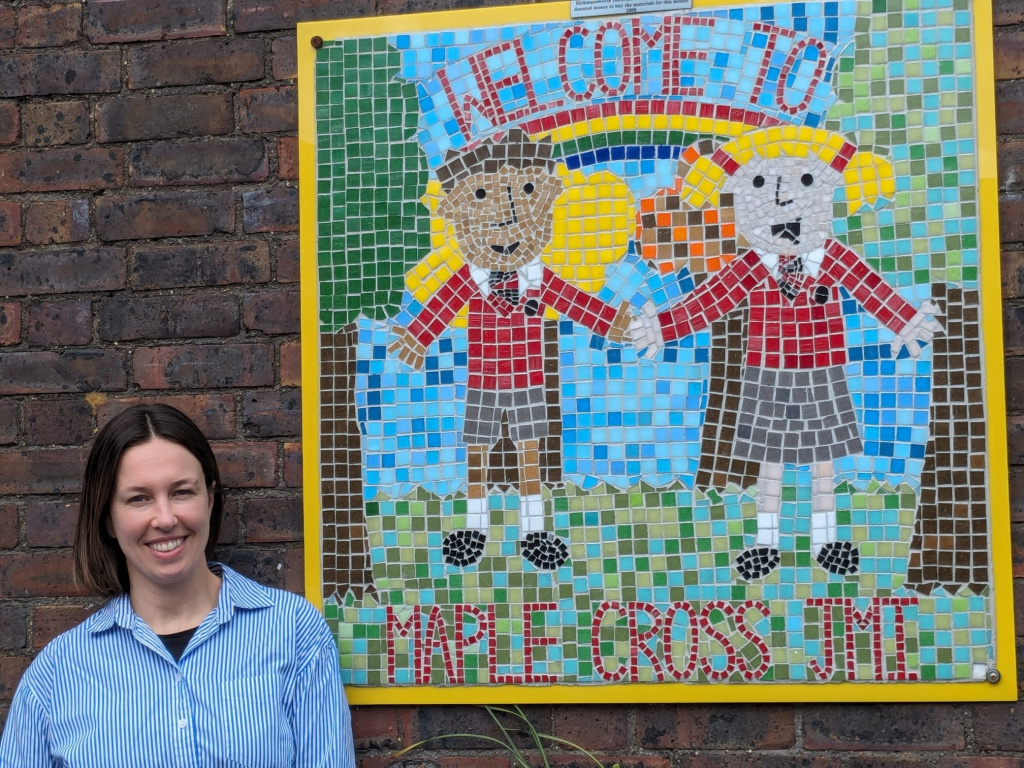
A steady decline in the UK birth rate over the past 10 years, coupled with families moving away from areas where it is no longer affordable to live – including parts of central London – has left hundreds of primary schools having to adapt to falling numbers of children. The Department for Education expects the number of pupils at state-funded schools to decrease by 944,000 by 2032.
For school leaders with falling numbers of pupils, there are many unique challenges: delivering quality education to children on a smaller budget, managing greater pressure on teaching and support staff, meeting the needs of learners in mixed-aged classes and maintaining strategic governance are just some examples.
Hannah Trickett, headteacher at Maple Cross JMI and Nursery School in Rickmansworth, is no stranger to these challenges. TeachingTimes has spoken with her about the challenges of running a small school and how she has tapped into the Small Schools Programme from HFL Education (formerly Herts for Learning) to help maintain educational excellence amid falling roll numbers and budgets:
TeachingTimes: How long have you been headteacher at Maple Cross JMI and Nursery School? Have you always taught in a smaller school?
Hannah Trickett: I have been the headteacher at Maple Cross JMI and Nursery School since September 2018, having been the deputy headteacher there for just under four years before that.
All of the schools I have taught at before Maple Cross have been very different. My first teaching position was at a three-form entry junior school. I then went on to teach at an expanding primary school in west Watford that grew from a two- to three-form entry. When I left there, we had approximately 700 pupils. Maple Cross was my first one-form entry school.
I am often asked what is better – one-form, two-form or three-form. The truth is, it is swings and roundabouts. There are pros and cons to all school structures, and the skill is to focus on what you can do and how to maximise the benefits to the children.
Please tell us a little about Maple Cross. What demographics does it serve in the Rickmansworth area?
Maple Cross is a small village in southwest Hertfordshire located just a few miles from Rickmansworth and Watford. Given our close proximity to the capital, our local area has always been popular with commuters to London and their families. However, Maple Cross is not well connected with public transport like some of our neighbouring villages and towns. As a result, a lot of commuters choose to live in adjacent areas and as a result, Maple Cross has become an area of higher disadvantage compared to nearby towns and villages.
As mentioned, the school itself is a one-form intake primary school serving families in the village and the occasional pupil who may travel from further afield – but this is rare. We have a school nursery on site and can cater for pupils of all abilities from nursery to Year 6. In addition, we also have a private nursery on site which provides term-time childcare for pre-school-age children. Having childcare options for younger children available is really important as it engages families earlier, and they will hopefully stick with us when they are looking for primary school places.

In terms of our vision, we may be small in size, but we are mighty in ambition! We strive for academic excellence in all areas of the curriculum through setting challenging, but ultimately achievable targets, for all our learners. With a personalised approach to education, we dare to think differently and do what is best for each of our learners and their families.
Why do you believe the school is on track to meet the DfE definition of a ‘small’ school? Are pupil numbers falling and if so, why?
At the moment, we have just under 170 pupils on roll, so we don’t yet meet the National Association of Small Schools’ definition of a small school, which is fewer than 100 pupils. But local admissions are plummeting. We may never quite get to the definition of a small school and remain just over that magic number of 100, but we are impacted in the same way as small schools, particularly regarding budgets and smaller staff numbers.
In terms of what’s behind the decline in numbers, the fall in pupil numbers can be in part attributed to falling birth rates, which is a national issue, but we’ve also found on a local level that many people have moved – or are moving – out of the Greater London area. During COVID, people wanted to move away from London and find more outdoor space. A lot of commuters also switched to working from home and so no longer needed to travel to the office or workplace every day.
After COVID, the cost-of-living crisis hit and inflation and high interest rates have seen rents and mortgages going up and up – it’s just not affordable for some families to live here anymore. That has definitely been a factor.
Another local challenge which impacts our roll numbers is a perception of school reputation. Maple Cross serves an area of significantly greater deprivation than some neighbouring schools. This means that some families would rather travel to schools in more affluent areas, despite the fact that we have a ‘good’ Ofsted rating!
I am part of a network of 16 schools in our area, and we are all seeing the same downward trend in roll numbers, so we have to be pragmatic. I think we’ll hit 120 in the next few years, so I need to have a long-term plan that prepares us for life as a small school.
What challenges are created by a shrinking pupil roll?
We are a one-form intake and currently have too many students for mixed-age classes, but that may soon become our reality as numbers continue to fall. It’s a prospect that the staff are rightly very apprehensive about, as it’s a very different way of teaching; you need to cater for children working at two different stages of their learning in one lesson.
We know that falling rolls also mean falling budgets, and we will need to maintain academic standards while working with a shrinking annual income. Understanding how we can make efficiencies without compromising on our academic delivery is key.
Another challenge is the workload required of a reduced number of staff. In short, there are fewer staff members having to do the same amount of work. In a larger school, for example, there might be teams leading a subject, whereas in a small school, each teacher is leading a number of subjects. It’s a huge workload.
What are you doing to prepare for these challenges?
HFL Education’s Small Schools programme has given us access to a gold mine of information, ideas and best practice on a range of small school challenges – there are little nuggets in every session.
The webinars are well-structured and punchy. They don’t take too long and I can watch live – which is ideal as you get to participate in the breakout sessions – or on demand at a time to suit me. I’m a busy head and don’t have a large team of staff to pick up the slack so I can do training, so being able to access a programme which covers a lot of ground but doesn’t take me away from the school day is ideal for me.

The session around funding was very useful. The ideas it generated and the time given to pause and reflect were crucial. Some ideas and suggestions discussed in the session were both obvious and simple, but when you are caught up in the day-to-day life of school you need an external voice asking ‘why’ or ‘why not?’
It also allowed for connections to be made. Following on from that webinar, I spoke over the phone to one of the headteachers who led one of the sessions. I was very honest about what was working and what needed tweaking in my school and together we looked at grants and how we use money.
The session around governors also catapulted me to start discussions with our own Chair of Governors about meeting structures and ways to inspire our governors to continue their aspirational strategic vision. We have an annual innovation meeting but how innovative are we really being? New governors joining provides an opportunity to ask some more questions and challenge ourselves, so this is something we are now focusing on going forward.
How effective has the programme been to date?
It has given me a lift in so many ways. The HFL Education experts and the schools who share their experiences in the webinars are all really positive about small schools and I’ve found it so revitalising at the end of a long school day when I feel like there’s not much left in the tank.
I feel like I’m not alone on this journey anymore and that I can do this. The people in the breakout sessions are so authentic and genuine too – they say ‘Email me if you have any questions’, and they really mean it!
What’s next for Maple Cross JMI and Nursery School?
Continuing to make connections is a big one for us. I have begun to make links with schools that have similar challenges and we share good practice, ideas and support. Leading a small school comes with a very unique set of challenges, so speaking to people who understand and can offer peer support is invaluable.
The Small Schools Programme has also galvanised us to know that sometimes we may have to make decisions that can be difficult and we must remember that change can be challenging for many people – whether they’re staff, parents or our governors. Changes in schools are often seen as negative, so we need to view them as opportunities going forward instead.
Our plans for the next two to three years are quite fluid. We have a number of options and we must ensure we keep considering all the avenues available to us, not just go for the ‘easy’ answer. It may be challenging to be a small school leader, but it is also very rewarding and I feel it is a huge privilege to be part of our school’s journey.
HFL Education’s Small Schools programme will be run throughout 2024, with previous sessions available on ‘catch up’ on the HFL Learning hub. More information and taster session booking can be found here.
Hannah Trickett is headteacher at Maple Cross JMI and Nursery School in Rickmansworth.
Register for free
No Credit Card required
- Register for free
- Free TeachingTimes Report every month